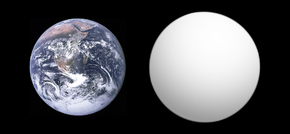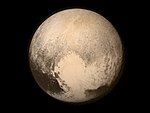 Size comparison of GJ 1132 b with Earth. | |
| Discovery [1] | |
|---|---|
| Discovered by | MEarth-South Array Team |
| Discovery site | Chile |
| Discovery date | May 10, 2015 (announced) [2] November 12, 2015 (confirmed) [3] |
| Transit | |
| Orbital characteristics [4] | |
| 0.0153±0.0005 AU | |
| Eccentricity | <0.22 |
| 1.6289304(13) d [5] | |
| Inclination | 86.58°±0.63° [6] |
| Semi-amplitude | 2.85±0.34 m/s |
| Star | GJ 1132 |
| Physical characteristics [4] | |
Mean radius | 1.130±0.056 R🜨 |
| Mass | 1.66±0.23 M🜨 |
Mean
density | 6.3±1.3 g/cm3 |
| 12.9±2.2 m/s2 | |
| 13.6±1.0 km/s | |
GJ 1132 b (also known as Gliese 1132 b) is an exoplanet orbiting the red dwarf star GJ 1132 41 light-years (13 parsecs) from Earth, [1] in the constellation Vela. The planet is considered uninhabitable but cool enough to possess an atmosphere. [2] GJ 1132 b was discovered by the MEarth-South array in Chile. [7]
It has been called "one of the most important planets ever discovered beyond the Solar System": Due to its relative proximity to Earth, telescopes should be able to determine the composition of its atmosphere, the speed of its winds and the color of its sunsets. [8] [9] [10] This is due in part to the small diameter of its parent star (20% that of the Sun), which increases the effect on the star's light of its transits. The planet's diameter is approximately 20% larger than that of the Earth [1] and its mass is estimated at 1.6 times that of Earth, [2] implying that it has an Earth-like rocky composition. [11] GJ 1132 b orbits its star every 1.6 days at a distance of 1.4 million miles (2.24 million kilometres). [7]
The planet receives 19 times more stellar radiation than Earth. [1] The equilibrium temperature is estimated at 529 K (256 °C; 493 °F) for an Earth-like albedo, or 409 K (136 °C; 277 °F) for a Venus-like albedo. The planet is likely to be hotter than Venus, as higher temperatures likely prevail at the surface if the planet has an atmosphere. [11] It is possible that the night side of the planet is cooler, because it is presumed to be tidally locked due to its proximity to its star; however, under most circumstances where an atmosphere is thick, it would be able to transfer heat to the far side.
Atmosphere
In April 2017, a hydrogen-dominated atmosphere was claimed to have been detected around GJ 1132 b. [12] [6] However, subsequent, more precise work ruled out the claim. [13] Instead, in 2021 detection of a hazy hydrogen atmosphere without helium but with the admixture methane and hydrogen cyanide (implying substantial underlying free nitrogen in the mix, at around 8.9% of the atmosphere) was claimed. [14] However, two subsequent studies found no evidence for molecular absorption in the HST WFC3 Spectrum of GJ 1132 b. Instead, the spectrum was found to be flat, [15] [16] which is more consistent with our current understanding of photoevaporation.
Gallery
-
An artist's impression of the exoplanet GJ 1132 b. [17]
See also
References
- ^ a b c d Berta-Thompson, Zachory K.; et al. (2015). "A rocky planet transiting a nearby low-mass star". Nature. 527 (7577): 204–207. arXiv: 1511.03550. Bibcode: 2015Natur.527..204B. doi: 10.1038/nature15762. PMID 26560298. S2CID 4385619.
- ^ a b c Chu, Jennifer (November 11, 2015). "New exoplanet in our neighborhood". MIT News. Retrieved 2015-11-12.
- ^ NASA Exoplanet Archive New ticker slide 1
- ^ a b Bonfils, X.; et al. (October 2018), "Radial velocity follow-up of GJ1132 with HARPS. A precise mass for planet 'b' and the discovery of a second planet", Astronomy & Astrophysics, 618: 12, arXiv: 1806.03870, Bibcode: 2018A&A...618A.142B, doi: 10.1051/0004-6361/201731884, S2CID 119394477, A142.
- ^ Kokori, A.; et al. (14 February 2023). "ExoClock Project. III. 450 New Exoplanet Ephemerides from Ground and Space Observations". The Astrophysical Journal Supplement Series. 265 (1) 4. arXiv: 2209.09673. Bibcode: 2023ApJS..265....4K. doi: 10.3847/1538-4365/ac9da4. Vizier catalog entry
- ^ a b Southworth, John; et al. (2017). "Detection of the Atmosphere of the 1.6 M🜨 Exoplanet GJ 1132 b". The Astronomical Journal. 153 (4): 191. arXiv: 1612.02425. Bibcode: 2017AJ....153..191S. doi: 10.3847/1538-3881/aa6477. S2CID 119049452.
- ^ a b "Astronomers Eager to Get a Whiff of Newfound Venus-like Planet". Harvard–Smithsonian Center for Astrophysics. November 11, 2015. Retrieved 2015-11-12.
- ^ Sample, Ian (11 November 2015). "Earth-like world could be 'most important planet found outside solar system'". The Guardian. Retrieved 2015-11-11.
- ^ Burgess, Matt. "Exoplanet GJ 1132b: the 'most important' ever found". Wired UK. Retrieved 2015-11-12.
- ^ "Getting Up Close and Personal with an Earth-Sized Exoplanet". The Kavli Foundation. November 11, 2015. Retrieved 2015-11-13.
- ^ a b Eva Botkin-Kowacki (2015-11-11). "Spotted: A rocky Earth-sized planet close by". The Christian Science Monitor.
- ^ "Atmosphere around super-Earth detected". Phys.Org. April 6, 2017. Retrieved April 6, 2017.
- ^ Diamond-Lowe, Hannah; et al. (2018). "Ground-based Optical Transmission Spectroscopy of the Small, Rocky Exoplanet GJ 1132b". The Astronomical Journal. 156 (2) 42. arXiv: 1805.07328. Bibcode: 2018AJ....156...42D. doi: 10.3847/1538-3881/aac6dd. S2CID 119061941.
- ^ Swain, Mark R.; Estrela, Raissa; Roudier, Gael M.; Sotin, Christophe; Rimmer, Paul B.; Valio, Adriana; West, Robert; Pearson, Kyle; Huber-Feely, Noah; Zellem, Robert T. (2021). "Detection of an Atmosphere on a Rocky Exoplanet". The Astronomical Journal. 161 (5): 213. arXiv: 2103.05657. Bibcode: 2021AJ....161..213S. doi: 10.3847/1538-3881/abe879. S2CID 232170188.
- ^ Mugnai, Lorenzo V.; Modirrousta-Galian, Darius; Edwards, Billy; Changeat, Quentin; Bouwman, Jeroen; Morello, Giuseppe; Al-Refaie, Ahmed; Baeyens, Robin; Bieger, Michelle Fabienne; Blain, Doriann; Gressier, Amélie (2021-04-05). "ARES.* V. No Evidence for Molecular Absorption in the HST WFC3 Spectrum of GJ 1132 b". The Astronomical Journal. 161 (6): 284. arXiv: 2104.01873. Bibcode: 2021AJ....161..284M. doi: 10.3847/1538-3881/abf3c3. S2CID 233025360.
- ^ Libby-Roberts, Jessica E.; Berta-Thompson, Zachory K.; Diamond-Lowe, Hannah; Gully-Santiago, Michael A.; Irwin, Jonathan M.; Kempton, Eliza M.-R.; Rackham, Benjamin V.; Charbonneau, David; Desert, Jean-Michel; Dittmann, Jason A.; Hofmann, Ryan (2022). "The Featureless HST/WFC3 Transmission Spectrum of the Rocky Exoplanet GJ 1132b: No Evidence for a Cloud-free Primordial Atmosphere and Constraints on Starspot Contamination". The Astronomical Journal. 164 (2): 59. arXiv: 2105.10487. Bibcode: 2022AJ....164...59L. doi: 10.3847/1538-3881/ac75de. S2CID 235125875.
- ^ "Hubble Sees New Atmosphere Forming on a Rocky Exoplanet". esahubble.org. Retrieved 24 March 2021.
![An artist's impression of the exoplanet GJ 1132 b.[17]](https://upload.wikimedia.org/wikipedia/commons/thumb/4/46/Artist%E2%80%99s_Impression_of_GJ_1132_b.jpg/347px-Artist%E2%80%99s_Impression_of_GJ_1132_b.jpg)



